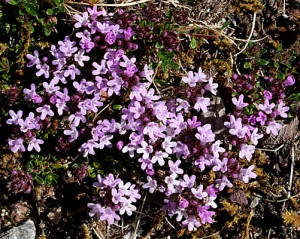Garden Thyme
Botanical Name: Thymus Vulgaris
Thyme is a perennial shrub, and a member of the mint family. With over a hundred varieties, the most common being garden and lemon thyme. It’s an aromatic herb that enhances flavor, stimulates digestion and improves appetite. Other than it’s culinary value, it has many properties for medicinal use. The main ingredient helps inhibit the growth of fungus and bacteria. Thyme is useful for treating respiratory congestion, bronchitis, asthma, whooping cough and sore throats.
Thyme is derived from the Greek “to make a burnt offering.” Ancient Egyptians used it for embalming. The Romans used it to purify rooms and to give cheeses and liqueurs an aromatic flavor. In the Middle Ages, Europeans placed it under pillows to promote sleep and ward off nightmares. Women would also give the leaves to knights to bring courage. It was also placed on coffins and burned as incense during funerals to send one into the next life.
Characteristics: A woody evergreen with with small gray-green leaves that roll under the edges. Flowers can range in color from violet to pale pink.
Care: It needs a sunny warm location. Thyme thrives well in dry soil and a well drained environment. Little water is needed, avoid humidity. Harvest time is usually in fall and winter, cutting it through these months will weaken the plant.
Harvesting: Best time to harvest is during the day when it has the highest concentration of oils. Shoots should be cut 4 inches above the soil before it blooms, usually in May or June. Bundle the shoots together and hang in a shaded area to dry. Once dry, take the leaves and buds for use in teas, cooking and medicinal remedies. Store in a jar away from light.
Uses:
- Ideal for flavoring all meats and vegetables.
- Increases digestibility.
- Calms the action of intestinal muscles and prevents gas.
- Thyme and Rosemary combined can increase effects.
- Oil from the plant is excellent for rubs, baths and washes.
Avoid Thyme oil while pregnant.
References:
- The Complete Guide To Natural Healing
Note: Consult with a Physician if you are seeking medical remedies. The information is not intended as medical advice. PagansWorld.org is not liable for the misuse of the information listed above.
Thanks for stopping by! Well wishes to you all and have a great day!
Lisa
Tags:





